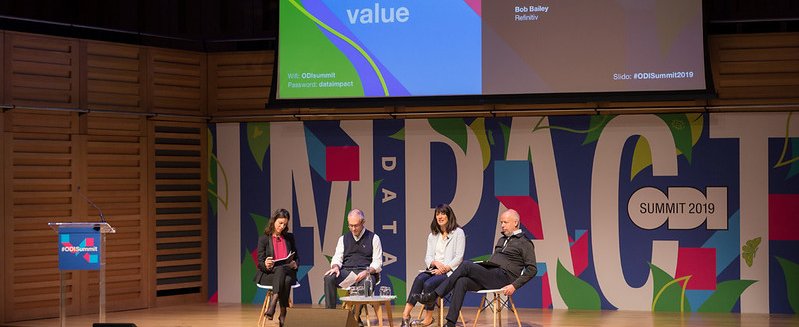
At the ODI Summit 2019, a panel of experts discussed how businesses can harness data to gain value. ODI’s Delivery Manager Walter Brown and User Researcher Sonia Duarte share what they learned
In November, we hosted the ODI Summit 2019 at Kings Place in London to explore the impact of data and how it can be used and shared, across a range of themes in the economy and society
The talk and panel session ‘Harnessing data to gain business value’ discussed how data sharing has bought value to businesses, and how businesses can use data to solve internal and sectoral challenges. This is the focus of a current ODI research project.
The session kicked off with talks from Rob McKendrick (Head of Data at the Co-op) and Andrew McMillan (Partner, Pinsent Masons). A panel session chaired by Orsola De Marco (Head of Innovation Programmes at the ODI), then followed with Volker Buscher (Chief Data Officer at Arup), Bob Bailey (Chief Information Architect at Refinitiv), and Myrna Macgregor (Policy Advisor at the BBC).
The benefits of ethics from the outset
The interaction between ensuring a trusted and ethical approach to accessing data and generating value was a key theme running through this year's ODI Summit. Highlighting how the ODI’s Data Ethic’s Canvas had helped the Co-op, Rob McKendrick framed the discussions of an ethical approach to data as a core business value. In the first of the two opening talks, Rob outlined the benefits of embedding ethics from the outset of any digital project – rather than being an afterthought. ensuring that ethics are considered at the beginning of projects improves efficiency by preventing the time-consuming unpicking of actions highlighted by defensive governance and policy measures further down the line. It also serves as a useful signal of strong practice for recruiting talent.
How trust is unlocking the value of new data
The importance of being a trusted handler of data was highlighted by all panelists, despite their variety of data uses. This ranged from understanding the issues faced by audiences to improve the BBC’s products and services, to ensuring the accuracy of information on financial market operations, and problem solving approaches to engineering issues. As Bob Bailey noted, maximising trust was at the very core of Refinitiv’s model to ensure that both providers and customers were able to rely on their information.
Being able to capitalise on the new and alternative forms of data being produced, when data can come from anywhere, provides huge opportunities for businesses. Sharing this data with those with others to innovate with it is often key for harnessing these opportunities. Myrna Macgregor highlighted how the sharing of anonymised data by the BBC with universities led to the creation of Ownit App, to help children interact with the internet for the first time. The more and varied data available, and greater number of ideas that can be generated from them, does increase the number of bodies involved leading to complex ecosystems. Bob Bailey emphasised this point with the need to establish standards for sharing to reduce the frictions involved in the process. This was echoed by Volker Buscher when he noted that it was in the interest of everyone to create efficient data sharing mechanisms.
The commercial of data trusts
One of the hot topics of the ODI Summit was data trusts. These are legal mechanisms to allow people and organisations to ‘share data in a fair, safe and equitable way’. Data trusts are a key focus of current ODI research and was the subject of the second of the opening discussions.
Andrew McMillan posed the question of whether the making of profit for a data trust could be compatible with being an independent steward of data. The argument that trustworthiness is not incompatible with making a profit is fundamental for how these institutions may develop. As McMillan noted though trust needs to be instilled in data trusts for stakeholders to engage at the outset. He made reference to the withdrawn IPO of WeWork over governance concerns to reflect that the public market has a good record of holding organisations to account for their commitments.
The critical nature of maintaining the balance between trust and profit was highlighted later by Volker Buscher as he maintained that while data trusts must be able to sustain themselves trust has to remain a core motive over profit. At question then is the economic model which is most appropriate to address stakeholder concerns, but also provides the opportunity for investment on the other. Trust and the value that may be extracted from data were thus underlined as the two sides of the same coin for how businesses approach data. These should be at the forefront of the mind of business decision makers when attempting to harness the value that data can bring to their organisations.
Find out more about the ODI Summit 2019 register for the 2020 event